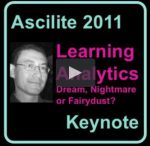Learning Analytics: Dream, Nightmare, or Fairydust?

Pervasive digital technology is weaving a fabric around our lives which makes it increasingly hard not to leave digital traces. We are experiencing an unprecedented explosion in the quantity and quality of data available not only to us, but about us. While some people find this blanket suffocating and threatening, for others, it marks an exciting new turn in our cultural evolution. The question for us is: what are the implications for learning?
One answer is it’s time to upgrade our computing kit. The learning platform and business intelligence vendors are rolling out analytics dashboards aggregating data into summary views, and will be a source of innovation as they seek to respond to customer needs — but what will institutions be asking for? It is conceivable that government education departments might see potential for league tables based on them.
Another answer is that, at last, we will have an evidence base previous generations of educators and academics could only dream of: real-time data streaming in from our students, even more from data shared by countless others who are happy to reveal their social networks, geo-location, and recommended books. Previously siloed scholarly datasets are now released into the wild, where they can be harvested and mined in a vibrant ecosystem of connected ideas, learners and educators.
Then there are those of a more cautious nature. So what if we have shedloads of data? Now we can drown faster. Learning, enquiry, argumentation, sensemaking, scholarship, insight — these skills are of an entirely different order, the highest forms of meaning-making, uniquely human. And what have analytics to say about the less tangible 21st Century skills that we need to nurture if the next generation is to manage the unprecedented complexity and uncertainty that they will inherit from us? Surely data analytics have nothing to say about intrinsic disposition to learn, emotional resilience in the face of adversity, the ability to moderate a discussion, resolve conflict, or ask critical questions? Finally, who is in control of analytics: are they tools to study learners, or tools to place in their hands, to create reflective, more agile individuals and collectives?
Analytics may in time come to be used to judge you — as a learner, an educator, or your institution. The challenge for us is to debate what it means for this new breed of performance indicators to have pedagogical and ethical integrity. What can and should we do, and what are the limits? Do they advance what we consider to be important in learning, teaching, and what it means to be a higher education institution in the 21st Century?
Item Info
URL: http://people.kmi.open.ac.uk/sbs/2011/12/learning-analytics-ascilite2011-keynote/Publication Date: January, 2011
Author(s): Simon Buckingham Shum
Source: Ascilite 2011 Keynote
Added to SoLAR June 19, 2014 •
•
Categories: Slide Sets
SoLAR Info Hub
[acps id="1945"]
